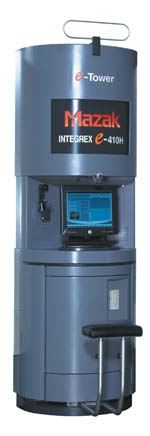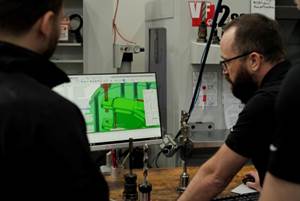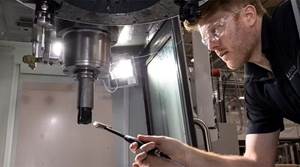Controlling The Cyber Shop
In recent years, technological trends have taken the form of multi-process machines with sophisticated monitoring and control systems. The ultimate purpose of marrying advanced hardware and software is to achieve a fully automated and more reliable manufacturing process.
Share





Regardless of current economic conditions, productivity remains the primary engine of business growth. In a global economy, the same types of products are manufactured in countries that have widely varying labor costs and regulatory environments. In this competitive arena, the position of American manufacturing depends on the intelligent application of new technology.
In the metalworking industry, more efficient production is an outgrowth of improvements in machine tools, related control systems and the strategies whereby these elements are integrated to create improved manufacturing processes. Mazak Corporation (Florence, Kentucky) continues to predicate its business on a firm conviction that the future of manufacturing belongs to companies willing to make the investments necessary to keep pace with the latest technology.
In recent years, this technological trend has taken the form of multi-process machines with sophisticated monitoring and control systems. The ultimate purpose of marrying advanced hardware and software is to achieve a fully automated and more reliable manufacturing process. Mazak's vision presupposes the advent of "Cyber Factories" in which actual machine parameters and performance are monitored virtually from remote locations. This, in turn, will allow a substantial reduction in human intervention and more accurate production planning.
Mazak's two-pronged response to the productivity challenge includes a new generation of multi-process machine tools designed to operate via an interactive control system. The heart of this control system is the e-Tower that combines the functions of a CNC with PC and multimedia capabilities. This device supports interactive production scheduling via the shop's internal network, monitors machine operation and provides job status updates in real time. Additionally, the e-Tower gives operators quick access to all machine operation and maintenance manuals on screen, as well as a virtual training program that covers all aspects of machine utilization. This includes tool and fixture selection, machine setups, programming, cutting simulation, prove-out and troubleshooting. The system's animated instructional programs are supported by both "voice over" and on-screen, written information.
A particularly important feature of this control system is its visual monitoring capability. The system incorporates three cameras, including two that allow the machining envelope and the ATC to be viewed on the e-Tower's screen. A third camera that is moveable may be positioned by the operator to show specific problems that might be located in blind spots. These images may be instantaneously transmitted to a third party at a remote site, such as one of Mazak's technical service centers.
In many cases, this visual capability eliminates the need for a shop to wait for arrival of a service technician to diagnose the problem. With direct communications and visual feedback available, many problems may be corrected without undue delays. Machine operators can also enter their own data related to various aspects of observed operations. This allows other operators to access information useful for optimizing the process. Additionally, a cell phone link between the machines and off-site personnel provides instant notification via e-mail of production status or machine alarms.
Mazak's multi-axis Integrex machines are designed to address the growing trend in manufacturing toward shorter product life cycles and the attendant switch from mass production to small or medium runs. Incorporating five-axis capabilities, these machines are designed to produce finished parts with only a single setup.
By combining this single-machine concept with the e-Tower's automatic monitoring and diagnostic system, it's possible for a shop to completely automate the production of prototypes and other short-run parts. This is true regardless of the number of machines operated. While conventional machine tools will continue to dominate mass-production applications, Mazak's new technology addresses the growing demand for manufacturing agility and just-in-time delivery. As such, it represents a point of entry to the totally automated cyber-factory of the future.
Related Content
The Power of Practical Demonstrations and Projects
Practical work has served Bridgerland Technical College both in preparing its current students for manufacturing jobs and in appealing to new generations of potential machinists.
Read MoreOrthopedic Event Discusses Manufacturing Strategies
At the seminar, representatives from multiple companies discussed strategies for making orthopedic devices accurately and efficiently.
Read MoreAutomated CAM Programming – Is Your Software Really Delivering?
A look at the latest automation tools in Autodesk Fusion 360 software and how forward-thinking machine shops and manufacturing departments are using them to slash delivery times and win more business.
Read MoreHow to Mitigate Chatter to Boost Machining Rates
There are usually better solutions to chatter than just reducing the feed rate. Through vibration analysis, the chatter problem can be solved, enabling much higher metal removal rates, better quality and longer tool life.
Read MoreRead Next
5 Rules of Thumb for Buying CNC Machine Tools
Use these tips to carefully plan your machine tool purchases and to avoid regretting your decision later.
Read MoreRegistration Now Open for the Precision Machining Technology Show (PMTS) 2025
The precision machining industry’s premier event returns to Cleveland, OH, April 1-3.
Read MoreBuilding Out a Foundation for Student Machinists
Autodesk and Haas have teamed up to produce an introductory course for students that covers the basics of CAD, CAM and CNC while providing them with a portfolio part.
Read More

















.jpg;maxWidth=300;quality=90)













